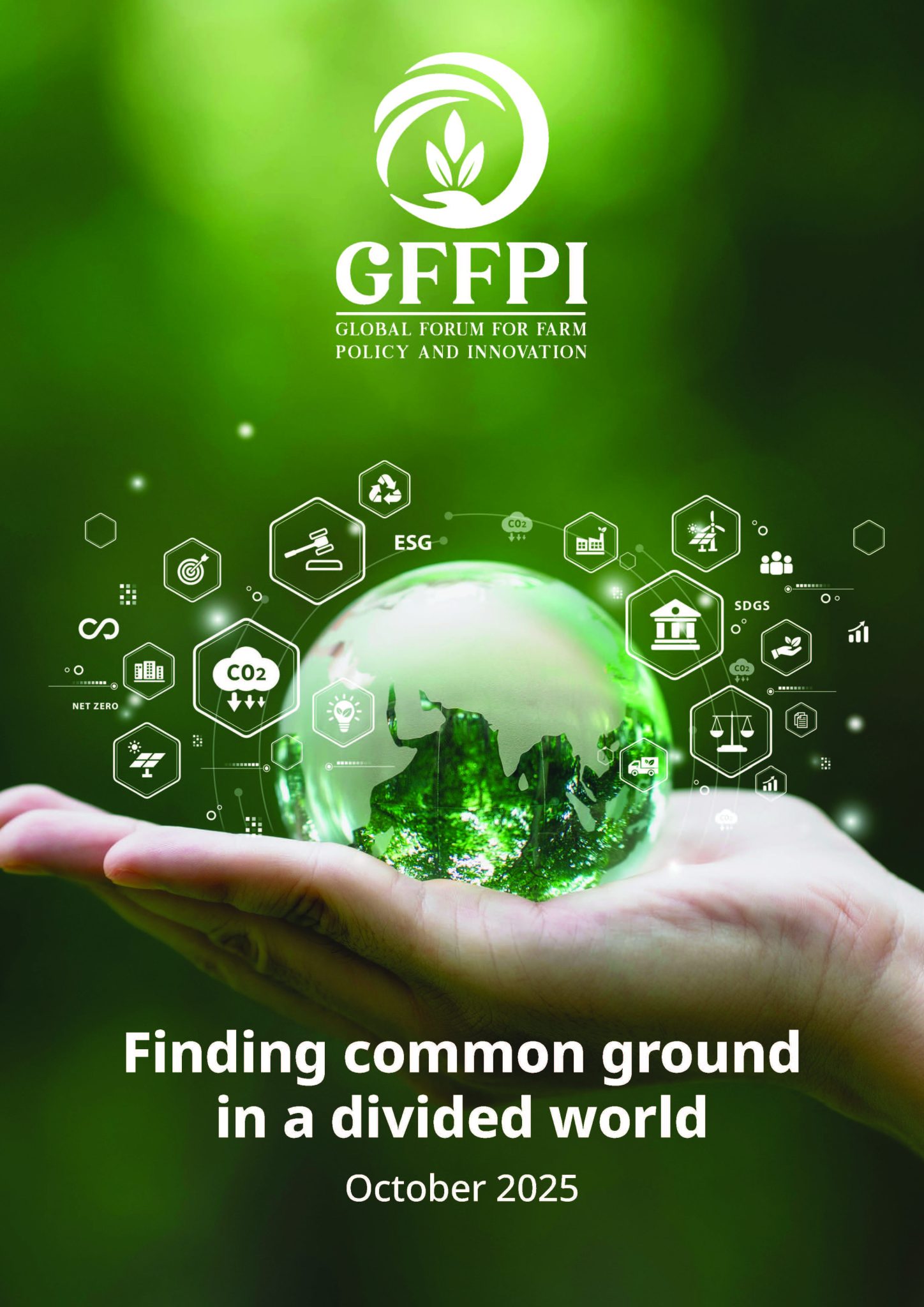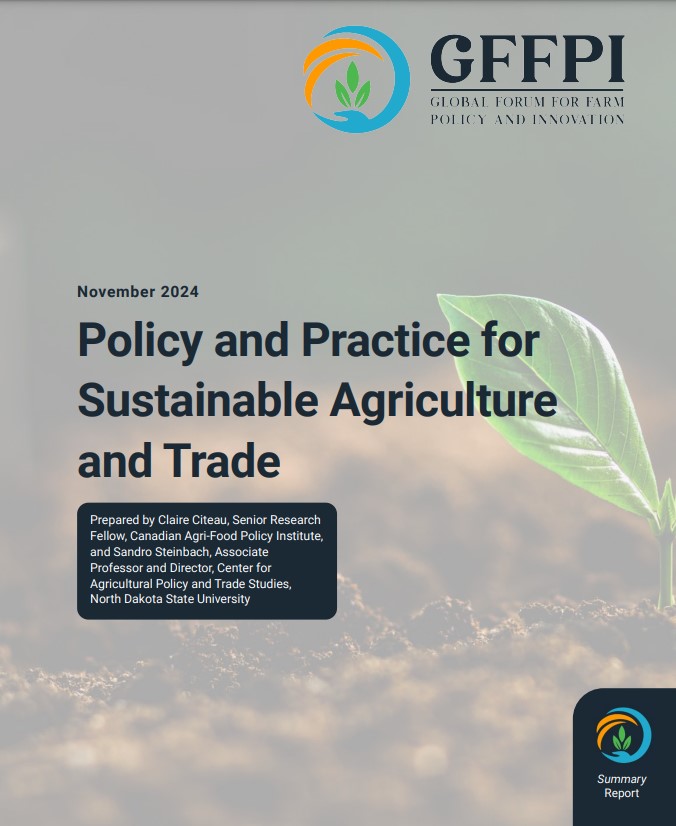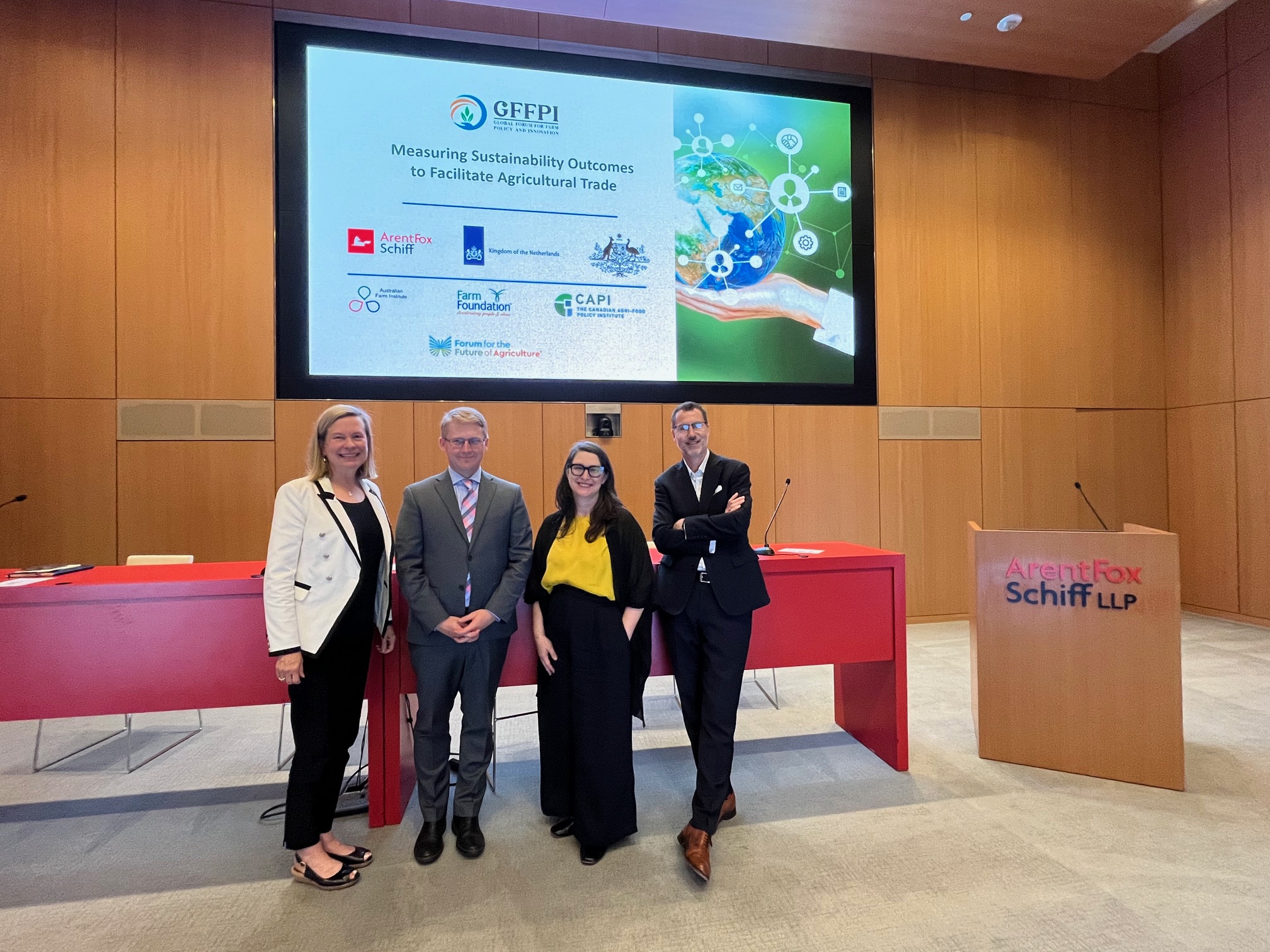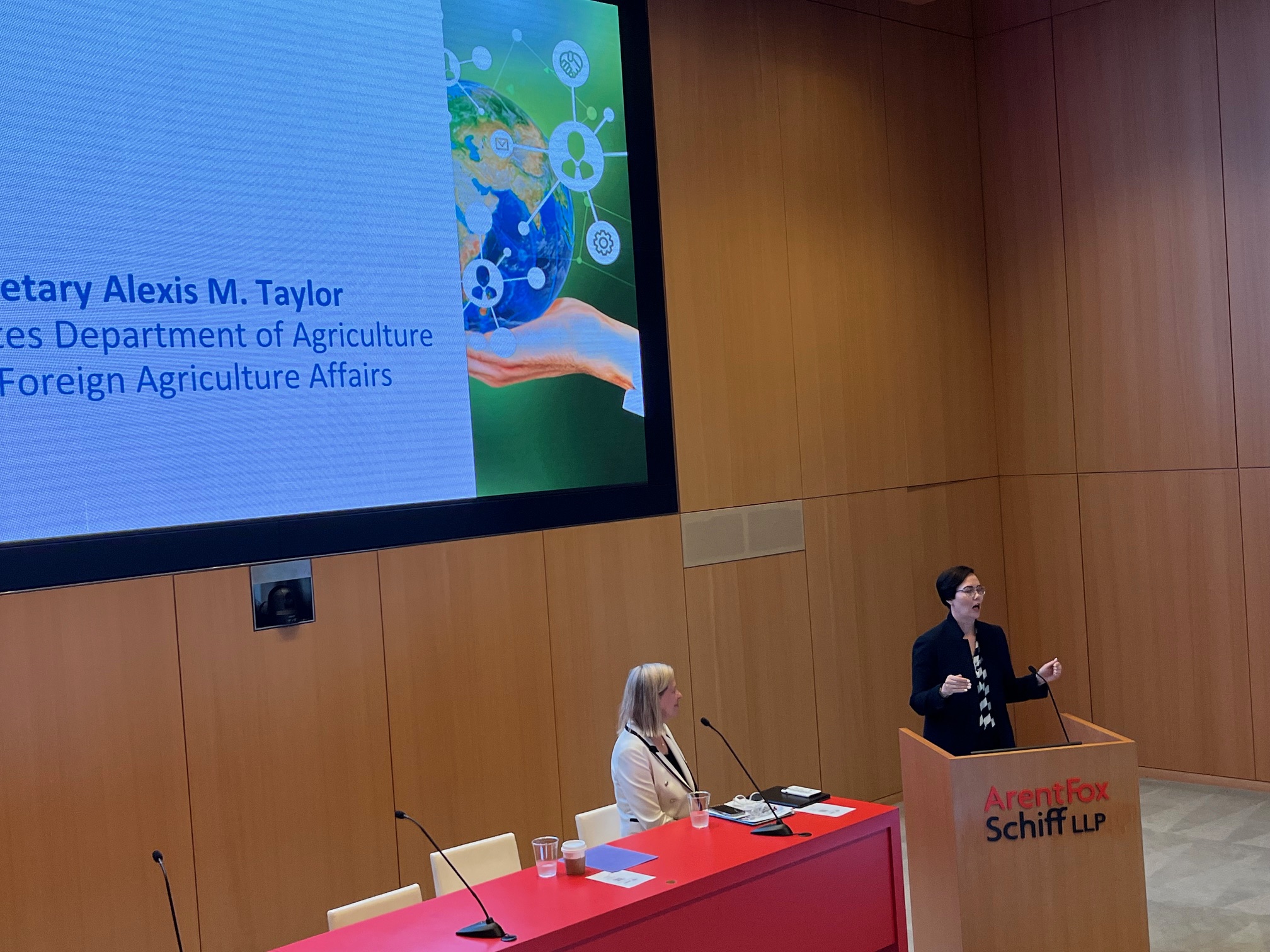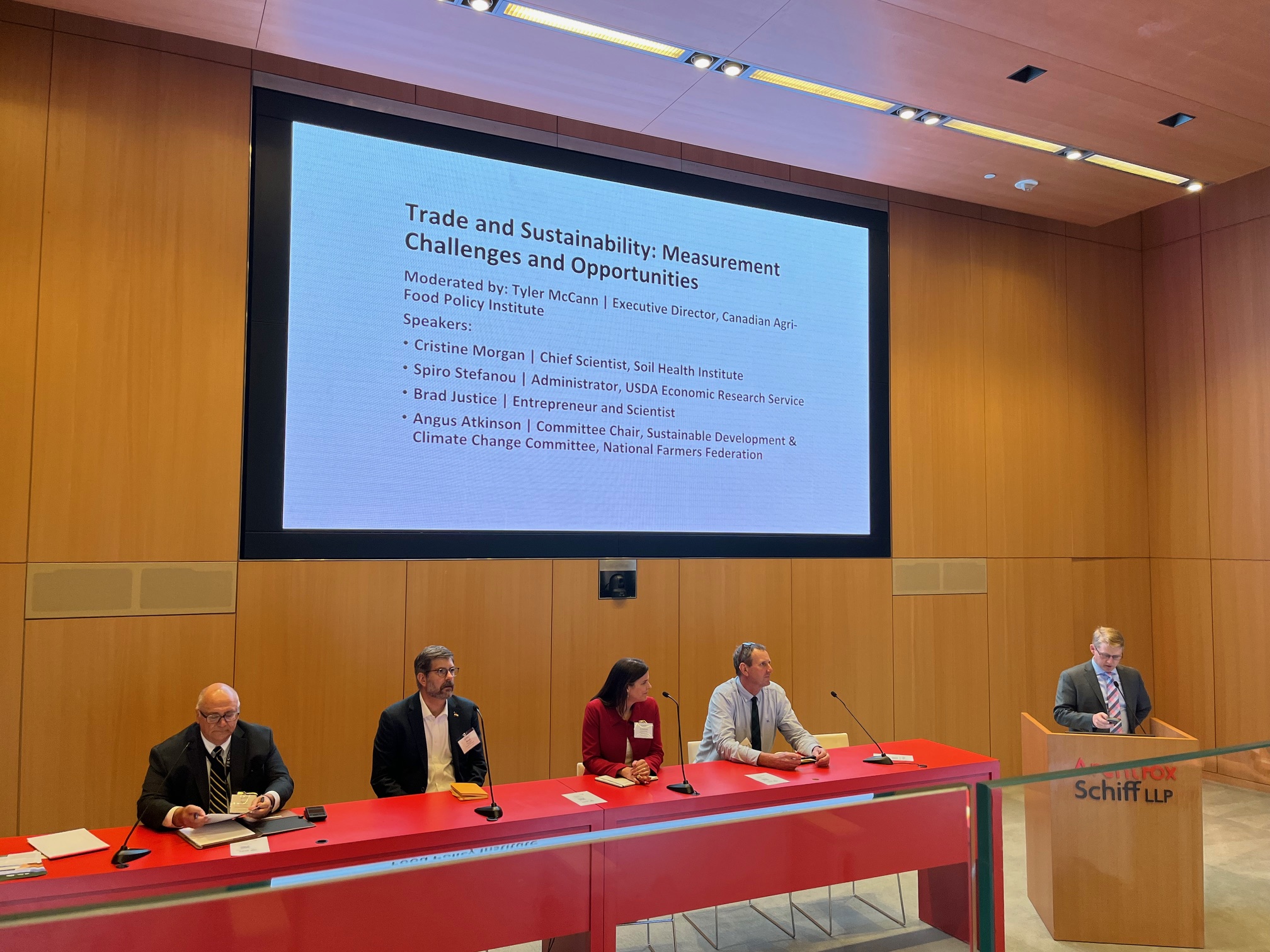In the Perspectives guest blog series, Farm Foundation invites participants from among the varied Farm Foundation programs to share their unique viewpoint on a topic relevant to a Farm Foundation focus area. Dr. Sandro Steinbach, the 2024 Farm Foundation Agricultural Economics Fellow, and Claire Citeau, a distinguished fellow at the Canadian Agri-Food Policy Institute, contributed this guest blog. In July 2024, they attended the Global Forum on Farm Policy & Innovation‘s second workshop, held in Washington D.C. on the topic of measuring sustainability outcomes to facilitate agricultural trade. An in-depth paper summarizing the event’s key takeaways and next steps is also now available.
As climate pressures increase and sustainable practices become a priority, the agricultural sector faces a unique challenge: balancing trade policies with the need for sustainable farming. In July 2024, global experts gathered at the Global Forum for Farm Policy & Innovation (GFFPI) workshop in Washington, D.C., to tackle these pressing questions. Here, we highlight key takeaways from the workshop on aligning global trade with sustainable agriculture.
Why Integrating Sustainability into Trade Matters
Global agriculture is at a crossroads as countries strive to boost productivity and meet sustainability goals without causing unintended trade disruptions. Trade plays a vital role in food security, yet poorly coordinated policies can lead to barriers, especially as more nations adopt individual sustainability measures. To keep the agricultural sector competitive and resilient, there’s a growing need for a unified framework to guide trade and sustainability.
The Challenges of Harmonizing Trade with Sustainable Agriculture
Sustainable agriculture protects natural resources, maintains profitability, and supports community well-being. While the concept is widely understood, applying it consistently across countries and trade agreements takes time and effort. The workshop underscored that each country faces unique hurdles in integrating sustainable practices. For example, while some regions prioritize carbon reduction, others focus on reducing food insecurity or supporting local farmers. As a result, a “one-size-fits-all” approach to sustainable trade isn’t feasible.
What Role Can Trade Agreements Play?
Trade agreements hold the potential to foster sustainability, but they must be crafted carefully. Adding sustainability chapters focused on environmental and labor standards can help, as can voluntary incentive-based programs that encourage best practices without restricting farmers’ flexibility. Workshop participants agreed that trade policy can be a powerful tool, but only if it promotes shared goals while respecting local contexts.
Adopting an Outcome-Based Approach to Measure Sustainability
One key takeaway from the workshop was shifting from traditional, input-based sustainability measures (such as mandating specific farming practices) to outcome-based approaches. This shift allows farmers to adapt and innovate while focusing on measurable results like soil health, carbon sequestration, and biodiversity. Though more complex, outcome-based metrics can yield more meaningful insights and foster an environment where sustainable practices are both encouraged and achievable.
The Importance of Global Standards and Local Flexibility
Global standards are essential for assessing sustainability fairly across different countries. However, rigid frameworks may overlook local realities, particularly for smallholder farmers who face unique challenges. Workshop discussions emphasized the importance of balancing global standards and local flexibility to ensure sustainability goals are relevant and achievable worldwide. This balance is critical for creating trade policies that don’t stifle innovation or penalize farmers in resource-limited regions.
Supporting Sustainable Innovation in Agriculture
International trade enables innovation by allowing the transfer of knowledge, technology, and best practices. Golden Rice, an innovation born of global collaboration to address vitamin A deficiency, was one example discussed at the workshop. Cross-border cooperation accelerates such breakthroughs, underscoring the need for open markets that allow agricultural innovations to reach areas most needed.
Recommendations for Sustainable Trade
The workshop concluded with actionable steps for aligning trade and sustainability:
- Adopt Flexible, Science-Based Policies: Avoid rigid policies and instead focus on outcome-oriented, science-based standards that allow flexibility for farmers to adopt practices locally.
- Invest in Consistent Metrics and Data Management: Developing universally accepted metrics will make sustainability more transparent and achievable, especially with emerging technologies like remote sensing and real-time data tracking.
- Strengthen Global Cooperation: Collaborating with institutions like the WTO and FAO can help establish frameworks integrating trade with sustainability. Global collaboration is essential to create cohesive, effective standards.
- Position Sustainability as a Trade Opportunity: Rather than viewing sustainability as a trade barrier, policymakers should consider it a pathway to new markets and greater competitiveness.
- Involve Farmers in Policy Development: Policies should reflect the realities on the ground, including the needs and challenges of farmers. Ensuring farmers’ participation in policy discussions helps craft practical and impactful solutions.
The Path to a Sustainable Agricultural Future
As agriculture faces mounting challenges, aligning trade with sustainable practices is essential. With thoughtful policies and collaborative efforts, global trade can support a more sustainable and food-secure world. The insights from the GFFPI workshop provide a strong foundation for future discussions, reminding us that trade policies should empower, not hinder, the transition to sustainable agriculture. With aligned policies and a shared commitment, the agricultural sector can advance toward a more resilient, sustainable future.
Claire Citeau is a distinguished fellow at the Canadian Agri-Food Policy Institute. She is also a senior fellow at the Graduate School of Public and International Affairs at the University of Ottawa. Sandro Steinbach is an associate professor in the Department of Agribusiness and Applied Economics and the director of the Center for Agricultural Policy and Trade Studies at North Dakota State University. They can be reached at cciteau@uottawa.ca and sandro.steinbach@ndsu.edu, respectively.
The post Rethinking Trade for Sustainable Agriculture in a Changing World appeared first on Farm Foundation.
